Home Tags Posts tagged with "initial public offering"
initial public offering
Twitter’s shares opened at $45.10 each in the first minutes of trading on the NYSE.
That is a 73% jump from the initial asking price of $26 a share, and it means the company is now valued at a little over $31 billion.
More than 13 million shares were traded once they became available an hour after the stock exchange opened.
It is the biggest technology listing since Facebook in 2012.
Twitter floated on the NYSE and not, as some initially expected, the technology-rich Nasdaq exchange, where the likes of Facebook are listed.
It was a big win for the NYSE, which decorated its exterior with banners promoting the offering on Thursday.
Twitter has more than 230 million users, but is yet to make a profit.
Shares in newly-listed companies are often volatile on their first day of trading.
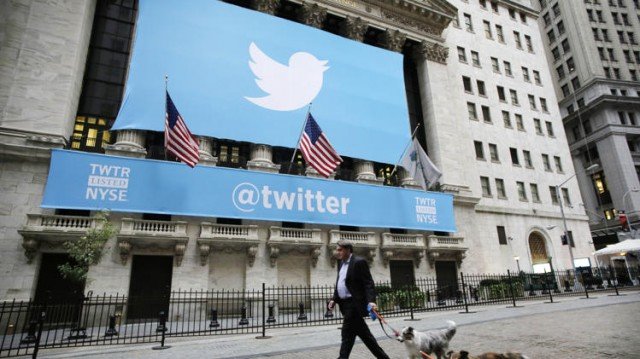
Twitter’s shares opened at $45.10 each in the first minutes of trading on the NYSE
Within minutes, Twitter’s stock price soared more than 80% before falling below its opening price by midday.
When Facebook launched on Nasdaq, its shares were priced initially at $38 each. The stock soared within hours of its debut to a high of $45. But its price later slumped.
It only recovered those losses by September 11, 2013, when shares again touched $45.
Its initial public offering (IPO) was also marred by technological glitches and delays.
To prevent Twitter’s stock sale from having a similar fate, the NYSE ran tests on October 26 using larger-than-normal share volumes.
Twitter is selling 70 million shares, which will raise more than $1.82 billion.
The company, which invites users to send tweets in 140 characters or less, has 232 million active users. According to its IPO documents, these users send 500 million tweets a day.
Twitter’s financials have been under greater scrutiny since it announced its plan to float, especially given that the company is still loss-making.
It lost $69 million in the first six months of 2013, on revenues of $254 million. About 85% of revenues come from advertising on its site, and more than 75% of Twitter users access the site from their mobile phone.
Mary Jo White, head of US regulator the Securities and Exchange Commission, recently warned investors to be cautious of the metrics used by technology companies like Twitter, nothing that investors have become overwhelmed by the sheer magnitude of data.
“In the absence of a clear description, it can be hard not to think that these big numbers will inevitably translate into big profits for the company,” Mary Jo White said in a speech.
“But the connection may not necessarily be there.”
Twitter’s founders saw their paper wealth soar to $4 billion in the wake of the stock surge early this morning, although boss Dick Costolo said that none of the founders would immediately be selling their shares.
The company’s co-founder Evan Williams has a 10% stake in Twitter, making him its biggest shareholder. That stake is now worth a little over $2 billion.
Jack Dorsey, another co-founder, also stands to make a fortune from the IPO. His 4% stake is worth more than a billion dollars.
Another co-founder, Biz Stone, is thought to have made millions of dollars by selling share stakes over the last few years.
[youtube 0YuUAROYPTo 650]
Twitter shares have been priced at $26 each, ahead of its debut on the NYSE on Thursday.
That is above the $23 to $25 range announced on Monday and values the short messaging service at more than $18 billion.
That makes it the biggest market debut for a technology firm since Facebook went public in May 2012.
Twitter has attracted 230 million users since starting seven years ago, but is yet to make a profit.
Its losses for Q3 2013 increased to $64.6 million, from $21.6 million a year earlier and a recent poll by Reuters/Ipsos showed that more than a third of registered users do not use the service at all.
Nevertheless there was strong demand for the shares and the company was able to raise the offering price twice.
Twitter has posted an increase in its sales, which more than doubled in Q3 to $168.6 million, and it is looking to raise even more revenue from advertisers outside the US.
Its $18 billion valuation includes the value of shares in compensation schemes for employees and other share awards.
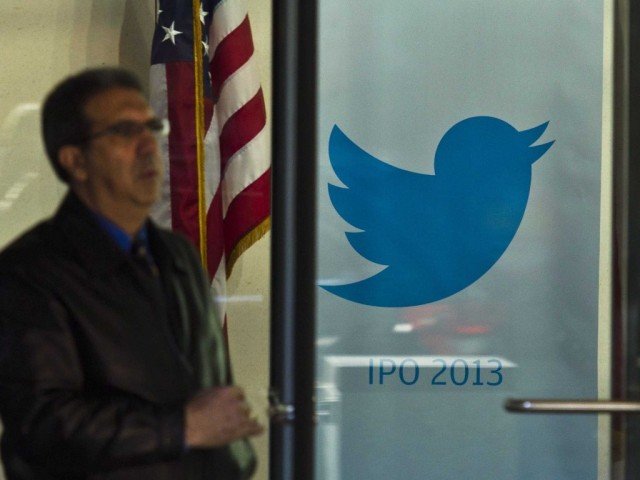
Twitter shares have been priced at $26 each, ahead of its debut on the NYSE on Thursday
Co-founder Evan Williams is the biggest shareholder in the firm with a stake of more than 10% worth more than a billion dollars.
Another of the founders, Jack Dorsey, will also become a very rich man. His 4% stake is worth more than half a billion dollars.
Biz Stone, another co-founder, is thought to have made millions by selling holdings over the last few years.
But Noah Glass, also one of the originals, is believed to have made very little from the company’s success.
Twitter is selling 70 million shares, which will raise $1.82 billion, for the company.
Unlike Facebook, Twitter has chosen to trade its shares on the New York Stock Exchange.
Facebook’s debut on the Nasdaq – traditionally the market of choice for technology firms – was marred by delays and problems with orders.
The NYSE has already tested trading of Twitter’s shares to try to avoid any technical hitches.
Twitter shares will trade under the symbol “TWTR”.
[youtube sKyh1fWSXMg 650]
The Empire State Building’s owners are planning to sell shares in the company, according to paperwork filed with regulators.
Empire State Realty Trust is aiming to raise $1 billion from listing on the New York Stock Exchange.
Some 71.5 million shares will be offered at a price of between $13 and $15 each. The final price will reportedly be set on October 1.
The landmark New York City skyscraper is the company’s most important asset.
The Empire State Building was opened during the Great Depression in 1931 and was the world’s tallest building until 1972 when the World Trade Center claimed its crown.
It is perhaps best known for its starring role in the 1933 movie version of King Kong.
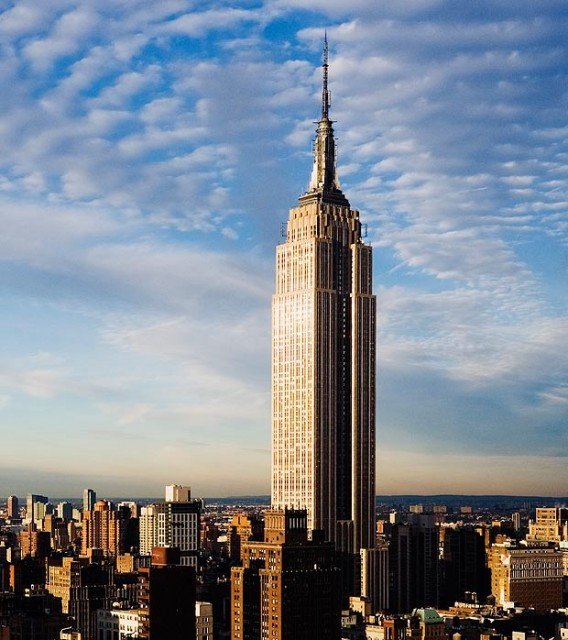
The Empire State Building was opened during the Great Depression in 1931 and was the world’s tallest building until 1972
The Empire State Building has also featured prominently in other films such as Sleepless in Seattle and An Affair to Remember.
Empire State Realty Trust, which is a real estate investment trust, holds more than 18 other properties in its portfolio.
Its initial public offering has taken two years to come to market because of opposition from a small group of investors.
But it is expected to be one of the largest initial public offerings of a US real estate investment trust.
An investor said he was “very satisfied” with the prospectus.
“I voted for the REIT [Real Estate Investment Trust],” Barrett Browd, who owns units in the Empire State Building said.
“I felt that it was a good time to cash in.”
Frugal billionaire Mark Zuckerberg continues to enjoy his budget holiday in Hawaii with his wife Priscilla Chan, while it has been revealed he is even richer than previously thought.
Mark Zuckerberg, 28, gained $2.3 billion from selling 60 million stock options just before Facebook’s initial public offering last year.
Facebook’s CEO and his Harvard-educated doctor wife are also rumored to be on the lookout for real estate in Hawaii.
Despite his latest windfall, sport-shorts wearing Mark Zuckerberg remains focused on the simple things in life. Rather than indulging in lavish dinners and extravagant outings, he has been spotted eating burgers and surfing in recent days.
Mark Zuckerberg isn’t the first frugal billionaire, Warren Buffet is another who would prefer to keep his wealth in the bank rather than spend it on extravagant purchases. He famously still lives in the same modest home he bought in 1958 for $31,500.
Facebook’s CEO has another reason to keep his vacation cheap and cheerful. According to regulatory documents filed Friday, he has also been saddled with a massive $1.1 billion tax bill. Money he raised by selling 30.2 million Facebook shares for $38 apiece in the IPO.

Frugal billionaire Mark Zuckerberg continues to enjoy his budget holiday in Hawaii with his wife Priscilla Chan, while it has been revealed he is even richer than previously thought
Facebook’s stock hasn’t closed above $38 since the IPO was completed last May. The shares gained 71 cents Friday to close at $26.85.
The 29% decline from Facebook’s IPO price has cost Zuckerberg nearly $7 billion on paper, based on the 609.5 million shares of company stock that he owned as of March 31, according to the regulatory filing. His current stake is still worth $16.4 billion.
Mark Zuckerberg, who started Facebook in his Harvard University dorm room in 2004, has indicated he has no immediate plans to sell more stock.
The proxy statement filed to announce Facebook’s June 11 shareholder meeting is the first time that the magnitude of Mark Zuckerberg’s stock option gain had been quantified.
The proxy also revealed that Mark Zuckerberg’s pay package last year rose 16% because of increased personal usage of jets chartered by the company as part of his security program.
Mark Zuckerberg’s compensation last year totaled nearly $2 million, up from $1.7 million last year. Of those amounts, $1.2 million covered the costs of his personal air travel last year, up from $692,679 in 2011.
If not for the spike in travel costs, Mark Zuckerberg’s pay would have declined by 17%. His salary and bonus totaled $769,306 last year versus $928,833 in 2011.
But despite being worth $13.3billion, Mark Zuckerberg enjoys life’s simple pleasures. Earlier this week he and his wife were spotted chatting with friends at picnic tables while snacking on Kauai’s famous Bubba burgers and smoothies.
The couple, who are notoriously down-to-earth, sported casual wear and Mark wore his now-famous sandals, which are parodied by Jesse Eisenberg in the film about Facebook, The Social Network.
Mark Zuckerberg, Facebook founder and CEO, and leading investors in the company cashed out millions of shares before the price dropped off, according to company filings.
It was also revealed that a company executive issued a warning days before the Initial Public Offering (IPO) that Facebook’s revenues are lower than expected, information that would have likely dropped the opening price of the stock.
The new reports are already raising questions about whether top investors profited from the IPO at the expense of smaller buyers.
On Wednesday shareholders filed a lawsuit against Facebook and the banks behind the company’s stock, Morgan Stanley and Goldman Sachs.
Additionally, both the Securities and Exchange Commission and the Financial Industry Regulatory Authority have begun looking into the matter.
The US Senate Banking Committee has also launched an inquiry and the state of Massachusetts has subpoenaed Morgan Stanley, demanding answers.
Facebook stock rose 3.3% in trading on Wednesday, rising to $32 a share.
However, a new analysis said the stock could fall to as low as $9.59.
That’s a far cry from the $37.58 that Mark Zuckerberg fetched for 30.2 million shares he unloaded on Friday. The founder of the social networking website made $1.13 billion on the sale.
By the end of trading on Tuesday however the price had dropped to $31 meaning Mark Zuckerberg saved himself a cool $174 million by getting out early.
Mark Zuckerberg, 28, still holds a vast amount of Facebook stock but his decision to sell off so much will leave investors wondering about his confidence in the company.
The drop is based around the realization that Facebook might not be growing as quickly as initially thought. And the company’s second-quarter growth will likely fall short of expectations as fewer new users join the social networking giant.
Shareholders filed a lawsuit on Wednesday, alleging that Mark Zuckerberg, Facebook and the banks that backed the Initial Public Offering, Morgan Stanley and Goldman Sachs, knew this information, but weren’t forthcoming with it.
On Tuesday, Reuters revealed that the banks’ analysts downgraded their estimates about the future earnings of the company while they were rolling out the IPO.
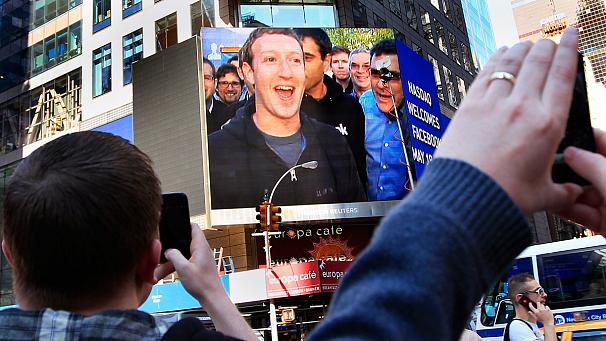
Mark Zuckerberg and Facebook leading investors cashed out millions of shares before the price dropped off
Business Insider called the move “unprecedented”.
Furthermore, the website reported that the banks revealed to privileged major investors that the share price was likely to tank, but left smaller stock buyers in the dark about this information.
The Securities and Exchange commission is investigating these allegations and the state of Massachusetts has filed a subpoena demanding Morgan Stanley release information about the IPO.
Mark Zuckerberg’s plans to sell were revealed in documents filed in advance of the IPO on Friday, but the problems that have happened since cast them in a new light.
Venture capitalist Peter Thiel also announced his plans early too but his return was beyond anything he could have hoped for.
He wrote Mark Zuckerberg a cheque for $500,000 in 2004 but has offloaded 16.8 million shares for the tidy profit of $633 million.
Among the others to cash out was Mark Pincus, the chief executive of online gaming company Zynga.
Eight years ago he gave Facebook a cheque for $40,000 but now has sold $38 million worth of stock.
Venture capitalists Accel Partners, which handed over $12.7 million back in 2005, sold $1.9 billion of stock but retained $5.8 billion.
Whilst the big players were making a fortune however, small investors have seen their attempts to get in on the Facebook bubble fall flat.
As of close of trading on Tuesday shares were a staggering 18 per cent below what they had been at the opening on Friday.
At one point they had slumped 31% from the $45 peak hit shortly after they started trading.
But according to analysts StarMine this could not be the end of it and the slide could carry on until stocks are just $9.59 each.
It has examined estimates from Wall Street experts and concluded that Facebook is currently vastly overpriced, though its forecasts do tend to be gloomier than others.
Eddy Elfenbein, editor at finance website Crossing Wall Street, said: “Facebook right now is going for far more than what it’s worth, it’s like buying $1 for $1.98, it just doesn’t make sense at this price.
“Just from basic modelling the stock should be around $17 to $20, and that is with a lot of variables.
“I would call that an ideal price. I would be interested in buying and I think that is a good deal for investors.”
Among those who did not cash out on Friday when Facebook shares were trading at $38 each was the company’s former president Sean Parker.
His stock is still worth over $2 billion but the price slump meant his fortune decreased by a staggering $300 million.
In a sign of how feeling is changing against Facebook, some commentators have begun comparing its activities to the most reckless behavior of Wall Street banks.
They have also coined the word “Zucked”, which means to get shafted on the sale of Facebook shares.
In a withering article in Time magazine Sam Gustin wrote: “Facebook’s highly-vaunted IPO – which was supposed to be a shining moment for the social network, as well as its lead banker Morgan Stanley and the NASDAQ exchange – has morphed into a debacle that’s reinforced some of the worst stereotypes about Wall Street: that corporate executives and their bankers engineer IPOs to maximize profits at the public’s expense; that Wall Street’s own systems have become too complex for its personnel to handle; and that the entire game is a hype-fueled casino, rigged for the house with a sucker played by the average investor.”
These major sell-offs comes as new allegations are emerging the over-hyped Facebook stock sale may have been rigged against small, every-day buyers.
Two separates lawsuits have been filed against the company and the banks that organized the IPO, Morgan Stanley and Goldman Sachs, alleging the executives knew second-quarter revenue would not meet expectations as Facebook’s growth slows.
Business Insider says this information was shared with the banks by a Facebook insider. As Mark Zuckerberg went on his pre-IPO roadshow, touting his company, the banks downgraded their revenue projections for Facebook.
This information could have reduced the value of Facebook’s initial stock offering. In turn, this could have decreased the amount of money Mark Zuckerberg and his early investors made when they dumped tens of millions of Facebook shares on Friday as trading opened.
However, the banks failed to widely disclose the downgrade, the lawsuits say.
Business Insider says they told only large, institutional investors so they would know to stay away from Facebook stock on the first day of trading.
Facebook denies the allegations in the lawsuit and said it will “vigorously defense itself”.
Morgan Stanley says it followed the same procedure it would for any IPO.
Facebook’s big winners cashed in early before shares price tumbled
Here is a list of the early investors in Facebook who made a bundle by cashing in portions of their stock Friday before share prices tumbled. Value is estimated at $38 a share. Also included is how much money each saved by getting out Friday, before shares sunk to $31.
Mark Zuckerberg
Shares sold: 30.2 million
Value: $1.13 billion
Saved: $174 million
Accel Partners, venture capital investor
Year invested in Facebook: 2005 for $12.7 million
Shares sold: 49 million
Value: $1.86 billion
Saved: $341 million
Peter Thiel, PayPal co-founder
Year invested in Facebook: 2004 for $500,000
Shares sold: 16.8 million
Value: $640 million
Saved: $119 million
DST Global Ltd, investment firm based in London and founded by Russian oligarch
Year invested in Facebook: 2009 and late 2010 for $200 million
Shares sold: 45.7 million
Value: $1.74 billion
Saved: $323 million
Goldman Sachs, investment bank
Year invested in Facebook: 2011 for $450 million
Shares sold: 28.7 million
Value: $1.09 billion
Saved: $200 million
Elevation Partners, private equity firm with Bono as spokesman
Shares sold: 4.6 million
Value: $176 million
Saved: $3.3 million
Greylock Partners, venture capital investor
Year invested in Facebook: 2006 for $27.5 million
Shares sold: 7.6 million
Value: $289 million
Saved: 53.4 million
The NASDAQ exchange saw Facebook shares jumping more than 10% within minutes of making their stock market debut.
Facebook shares rose to $42, having been initially priced at $38 each, before falling back to trade flat.
Mark Zuckerberg, 28, who started Facebook while at university, remotely opened trading on the Nasdaq earlier.
He appeared via a video link from a celebration at the firm’s headquarters in California.
There had been a delay of about half an hour in the start of trading in Facebook shares, which analysts say reflected the huge demand for the stock.
The $38 initial share price values the eight-year-old social network site at $104 billion.
Strong demand had led the company to increase both the price and the number of shares available for sale.
Facebook’s owners are releasing just under a fifth of the company’s total shares, about 421 million, which could raise about $18 billion.
The site is largely used for social updates, and although Facebook has said its use on mobile devices are the key to new profits, analysts question how much room there is for advertising on such platforms.
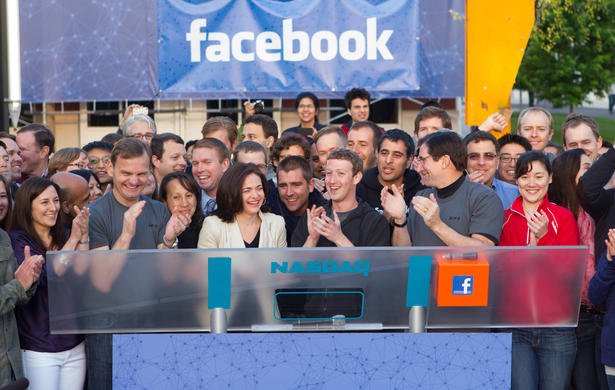
The NASDAQ exchange saw Facebook shares jumping more than 10 percent within minutes of making their stock market debut
Car giant General Motors added to those doubts by saying on Tuesday that it would no longer pay to advertise on the site.
Online strategy consultant Atul Chitnis said the question was whether Facebook had a strategy to bring advertisers in.
“My belief is that Facebook does have a strategy, they are ready with something they have not yet talked about,” he said.
“How effective it is we will have to watch and see.”
He also said he expected to see a “brief burst” of the share price going up and then “sinking again” in a couple of days.
Facebook’s valuation means the social network site is worth about the same as internet shopping giant Amazon, and more than the value of stalwarts such as Disney.
The initial public offering (IPO) of the shares is the third-largest in US history, after the financial giant Visa and General Motors.
Facebook employees had been up all night ahead of the event, taking part in a “hackathon” at the company’s headquarters in Menlo Park, California.
It is an event in which programmers work on projects and come up with new ideas.
Facebook’s profits are tiny in relation to its size – it makes about $5 a year for each of its 900 million users – and its plans to increase profitability are unclear.
Oliver Pursche, president of Gary Goldberg Financial Services, said ahead of the flotation: “We’re telling our investors to hold off.
“Number one, we don’t know what the guts and the balance sheet of the company looks like yet so that’s a big red flag for us. We want to understand the business before we tell people to invest.”
Facebook also faces concerns over privacy.
Indeed, on Friday a class action suit was brought against the company in the US for “improperly tracking the internet use of its members even after they logged out of their accounts”.
Facebook itself has previously warned about the possible impact of evolving legal protections across the world on consumer privacy, and specifically a revision to the European Union’s privacy laws.
Other internet companies have had mixed experiences when they have started selling shares.
Online games maker Zynga’s shares fell 5% on their first day of trading in December 2011.
But shares in business networking site LinkedIn more than doubled on their debut in May last year and are still trading well above that level, while Groupon shares jumped 30% on their debut in November.
However, they have since fallen back, particularly after the daily deals firm admitted in April that it had overstated its previous revenues and earnings.
Facebook’s flotation had an immediate impact on the value of these companies, as their share prices fell at the same time as Facebook’s fell back from its initial spike.
Groupon dropped 5.6%, LinkedIn fell 1.2%, while shares in Zynga were suspended after plunging more than 13% in a matter of minutes.
The new Facebook shareholders will not have much say in how the business is run.
The shares on offer are “A” shares, which carry one vote per share, as is normal, but the current owners’ shares are “B” shares, which carry 10 votes each.
They will control more than 96% of the votes after the flotation, with founder Mark Zuckerberg holding just under 56% of the voting power of the company.
Mark Zuckerberg, who owns about 25% of the company, stands to gain the most from taking Facebook public. Fellow founders Dustin Moskovitz and Eduardo Saverin will also become paper-billionaires overnight, as will Napster founder and former employee Sean Parker.
US venture capital firm Accel Partners and Russian internet investment group Digital Sky Technologies also hold significant stakes in Facebook, while software giant Microsoft and U2 frontman Bono also stand to make a huge profit on their investment in the company.
Facebook is preparing the process of becoming a publicly-listed company this week, valuing the social networking site at between $75 billion and $100 billion, reports suggest.
Facebook plans to file papers with the US financial watchdog on Wednesday, according to the Financial Times and the Wall Street Journal.
The flotation later this year would raise about $10 billion, they reported.
This would be one of the biggest share sales seen on Wall Street.
It would dwarf the $1.9 billion raised by Google when it went public in 2004.
It would still, however, be some way short of the $20 billion raised by carmaker General Motors in November 2010.
The reports suggest that Morgan Stanley will be the lead underwriter for the sale, with Goldman Sachs also expected to be heavily involved.
Rumours of Facebook’s so-called initial public offering (IPO) have circulated for many months, and the company has maintained it will not comment on the subject.
The reported valuation would make Facebook one of the world’s biggest companies by market capitalization.
“Facebook a brilliant achievement, but $75-$100 billion? Would make Apple look really cheap,” said Rupert Murdoch on Twitter.
Facebook was started by Mark Zuckerberg and fellow students at Harvard University in 2004 and has quickly grown to become one of the world’s most popular websites.
It makes most of its money through advertising.






